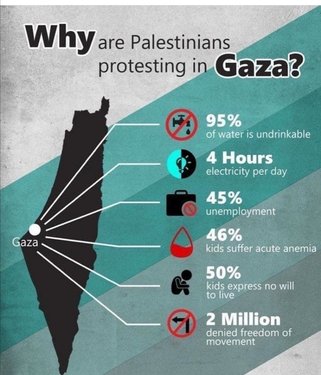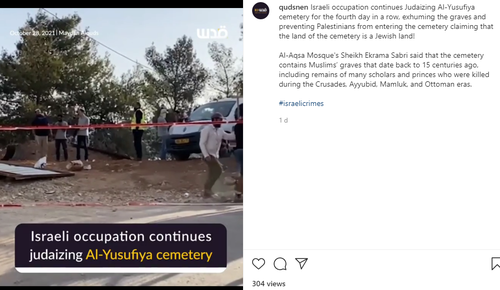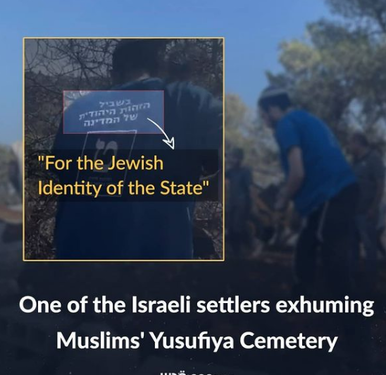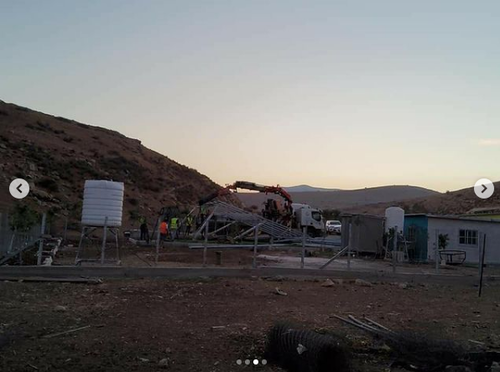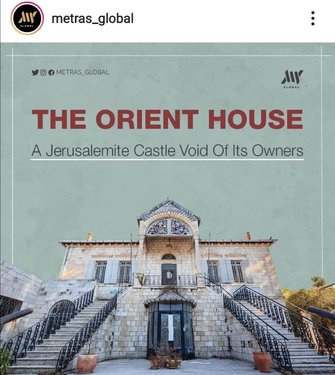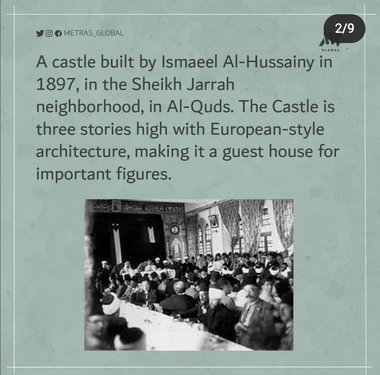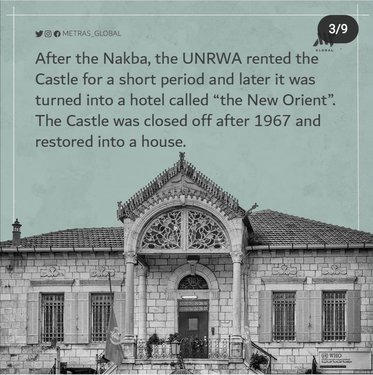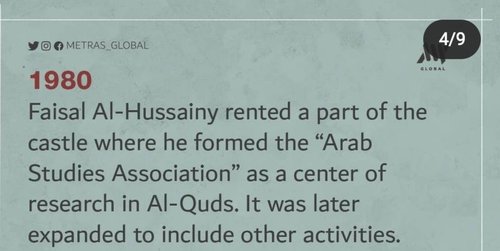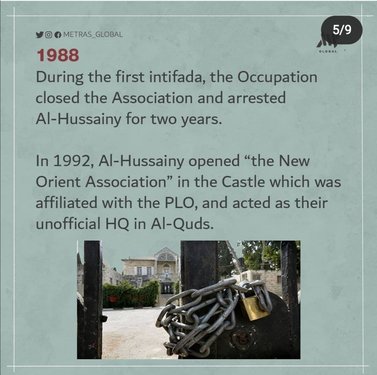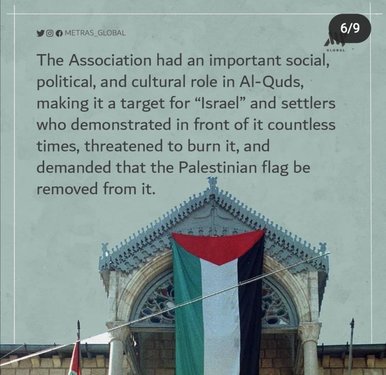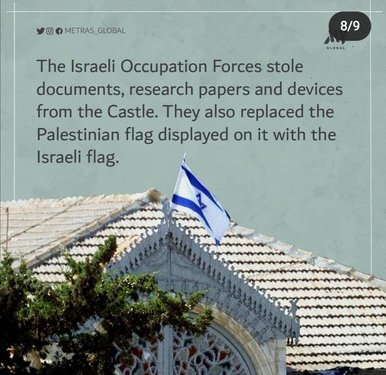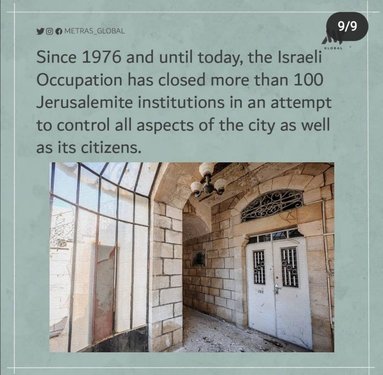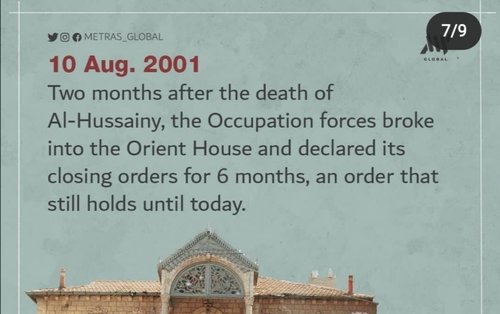-
Posts
8,434 -
Joined
-
Days Won
771
Content Type
Profiles
Forums
Events
Everything posted by ummtaalib
-
Towers of Torture (Al-Quds) The Israeli Occupation Forces are using the fortified watchtowers they built in Bab Al-Amoud Square in al-Quds (Jerusalem) to carry out their brutality and aggression against Palestinians, particularly the youth. Inside these towers, members of the Occupation police deliberately beat and search young Palestinians while humiliating and degrading them. In early 2018, the Israeli Occupation built three fortified military towers around Bab Al-Amoud, a neighborhood where the majority of Palestinians have to pass through in order to get to the Old Town. The construction of the towers was part of the Israeli Minister of Internal Security plan to “increase the safety” of Bab Al-Amoud soldiers. Its construction was accompanied by the installation of dozens of cameras around the area. Since its construction, the Israeli Occupation Forces took advantage of these rooms, where there are no surveillance cameras, in order to forcibly attack young Palestinians. This includes beating them with the stocks of their rifles, blasting them with pepper spray, and assaulting them directly. www.instagram.com/p/CVk9BwHtRa3/
-
The massacre of the village of al-Dawayima The massacre of the village of al-Dawayima is considered to be one of the major massacres of the 1948 War, and perhaps the most horrific. Unlike massacres carried out by Zionist paramilitary groups, such as Deir Yasin on 9 April, the perpetrators of the al-Dawayima massacre were regular armed forces with operational planning capacity. They were part of the armed forces of the new state that, having firmly established its presence, was seeking recognition by the international community and was preparing its application to become a member state of the UN, which meant a pledge to respect all the commitments specified by its charter. Moreover, the massacre of al-Dawayima was not followed by condemnations from Palestinians and Arabs; more than three decades passed before it received attention from scholars and the media. Al-Dawayima was one of the largest villages in the Hebron subdistrict. It was located 24 km from the city of Hebron and was less than 500 meters above sea level. To its north lay the village of Bayt Jibrin, to the east Dura and Idna, to the west al-Qubayba and Arab al-Jabbarat, and to the south the farmland of Dura. Its land area was 179 dunams and its population was 3,710 according to the British Mandate census of 1945. The village was known for its many ancient Roman ruins. It was famous for its olive groves and was the location of one of the most important farmer’s markets in the region every Friday, suq al-barrein (“the bi-terrain market”), named by the villagers in reference to its produce from both hilly and flat regions. The village was located in an area of skirmishes between the locals and the Israeli colonies after the end of the Mandate and the departure of the British army. The people of al-Dawayima set up a local committee to handle the defense of the village and purchase weapons. This committee bought several rifles and small quantities of ammunition from some Egyptians. In the five months that followed the UN Partition Resolution in November 1947, the villagers and other resistance fighters in the Hebron hills engaged in fierce, grueling battles with the Zionist forces such as the one with the settlement of Gush Etzion. In October 1948, the fighting came closer to al-Dawayima, particularly when the Israeli forces were able to occupy a number of nearby villages, starting with al-Maqhaz. They were trying to cut off the Egyptian troops who were stationed in the villages of Iraq al-Manshiyya and al-Faluja and to establish a direct connection with the settlements north of the Bayt Jibrin–al-Faluja battle line. Matters became grave in the latter half of October when Israel decided to break the Second Truce with the Arab armies and launch Operation Yoav in southern Palestine. Its attacking forces renewed their assault on al-Faluja and Iraq al-Manshiyya, which made the capture of al-Dawayima and its neighboring villages imminent. The young men of the village began organizing nightly guard duty to be prepared for any potential attack. On 27 October 1948, the Egyptian troops withdrew from Bayt Jibrin to Hebron and the people of the villages of Bayt Jibrin and al-Qubayba withdrew along with them in the direction of al-Dawayima and other villages, which meant the Egyptians were completely surrounded in what was later known as the Faluja Pocket. Incidentally, one of their battalions was led by Gamal Abdel Nasser, who later became president of Egypt. The people of al-Dawayima attempted to contact the commanders of the Arab armies to ask for protection, but to no avail. This caused panic among the villagers, and some of the women, children, and the elderly left for safety. On 29 October 1948, as the villagers were finishing Friday prayers, news came that the Zionist forces had reached the outskirts of the village. The assault was carried out by the 89th commando battalion, which was part of the Israeli army’s 8th Armored Brigade, under the command of Yitzhak Sadeh, the founder of the Palmach. The soldiers launched the operation from al-Qubayba in tanks equipped with artillery and machine guns. Upon reaching the outskirts of the village, they split up into sub-groups that attacked the village simultaneously from three directions, opening heavy fire from the north, south, and west while leaving the east open. The village had no more than twenty armed men to defend it based on its western side to try to halt the attack. Some of them opened fire with their rifles, while others massed boulders at the entry points to the village to impede the attackers’ advance. Meanwhile, a number of the villagers took shelter in the village mosque. Others chose to remain in their homes or fled in the direction of Dura and its surrounding villages. One group hid itself in the nearby caves and grottos. In the face of the overwhelming strength of their attackers, the men defending the village abandoned their posts. The Israeli artillery began pounding the village’s houses and shooting at those who were trying to escape. By midday, the Zionist forces entered the village from the three directions without any significant resistance and began to carry out a massacre. They did this by targeting villagers in three stages: first, in their homes and alleyways; second, in the village mosque; and third, in a cave in the Tor al-Zagh area. There were two main eyewitnesses to the killings that took place in al-Dawayima: the village mukhtar, Hassan Mahmoud Ihdeib, and an Israeli soldier. The mukhtar’s testimony was part of a letter sent on 14 June 1949 by the secretary of the Arab Refugee Congress in Ramallah to the United Nations Conciliation Commission for Palestine, which had convened in Lausanne with the participation of Israel and the concerned Arab states. In it, he stated that when Israeli armored cars stormed the village and started firing, a number of soldiers disembarked on the village streets and started shooting indiscriminately at anything they saw moving. While the elderly took refuge in the mosque, the other villagers started to flee, the mukhtar himself included. However, the following night he returned to the village with some others to find out what happened to those they had left behind. They found around sixty bodies in the mosque, mostly of the elderly, including his own father. They saw a large number of bodies of men, women, and children in the streets. They then made their way to the cave of Iraq al-Zagh, and at the mouth of the cave they found eighty-five bodies, also of men, women, and children. The mukhtar gave his testimony again in 1984 to an Israeli journalist for the newspaper Hadashot, where he gave additional details; for example, the villagers who had taken shelter in the caves were discovered by the attacking troops. They were ordered to form one single line and march eastwards. As they started to walk, the Israelis opened fire on them. He also recalled that some people returned the following night to bury the bodies in a well. To verify the accuracy of Ihdeib’s claim, the journalist brought four laborers and accompanied him to the spot he had indicated to dig inside the intended well. Indeed, there they discovered human remains – bones and skeletons in a pile and three skulls, including one belonging to a small child – after which the workers stopped digging. Having verified that a massacre had taken place, the journalist went ahead and published her article on 24 August 1984. The Israeli soldier’s testimony was recorded by S. Kaplan, one of the members of the Mapam Party, who included it as part of a letter he sent to the editor-in-chief of the party newspaper Al-HaMishmar on 8 November 1948, nine days after the massacre occurred. The letter remained suppressed until the Israeli historian Benny Morris discovered it by chance and referred to it in his book The Birth of the Palestinian Refugee Problem published in 1987. (The letter was published in full in Haaretz newspaper in 2016.) The soldier recalls that they encountered no fighting or resistance in al-Dawayima and that the first wave of troops that attacked killed between 80-100 Arabs, smashing the skulls of children with sticks. Then another batch blockaded all those who had remained home and brought explosives engineers to blow up the houses with the people alive inside them. The solider narrates how one commander ordered the explosives engineer to put two elderly women into a house and then blow it up. The engineer refused to carry out the order, but it was still carried out by other soldiers. He also tells the story of a woman with a newborn who was ordered to clean the backyard of a house where the soldiers were eating, after which she and her infant were shot dead. In his letter, Kaplan wrote that over the last two weeks he had been listening to stories by soldiers and commanders boasting of their skill in carrying out murders and rapes and how these acts should be considered as stellar “missions” for them. He admitted that his party faced a dilemma: openly circulating this information would have a damaging effect on the image of the new state. The survivors who managed to reach Hebron informed the UN observers and Arab officials that the Israelis had re-enacted the Deir Yasin massacre in al-Dawayima. The UN made three requests that the Israelis allow its observers to visit the village to investigate; each request was rejected. Then on 8 November, permission was granted to two UN officers to visit the village. The two observers noticed that smoke was still coming out from a number of houses, and some of them were giving off a strange smell that resembled something like burnt bones. When they demanded to inspect the village mosque, an Israeli officer told them they could not enter mosques out of respect for tradition, but a quick glance was enough to confirm that the Israeli soldiers had obviously desecrated the place. Then the Israelis prevented them from examining the other end of the village on the pretext that the Arabs had planted land mines there. However, one of the observers remained skeptical, as the sector in question directly faced the front line with the Arab armies and it would not have made any sense for the Arabs to plant land mines there. When it came to evacuating civilians, the Israelis denied having used force to expel them and even claimed that the villagers fled when the Arab forces withdrew from the area. The exact number of victims of the massacre is unknown but is estimated to have been in the hundreds. Reports in the Hebron police headquarters pointed to the killing of around 200 of the villagers of al-Dawayima who had taken refuge in the village mosque, most of them elderly and not physically capable of fleeing. The command of the Egyptian garrison in Bethlehem reported that there were 500 victims, while the American consul in Jerusalem wrote in his report that based on the news that had reached him, between 500 and 1,000 Arabs were killed in al-Dawayima. The village mukhtar himself said that he had tallied the number of victims at 455 and had delivered a list with the names of the victims to the Transjordanian military governor. The mukhtar reported also that there were other victims among those who had taken refuge in the village earlier, but the number of which he was unable to determine. Ben-Gurion also pitched in, saying he heard rumors that the Israeli army had killed 70–80 people. The matter of al-Dawayima was raised in December 1948 during an Israeli cabinet committee’s discussion of transgressions committed during the 1948 war. Aharon Cizling, the minister of agriculture (from the Mapam Party), said that he considered the soldiers to have committed Nazi-like acts and expressed his dissatisfaction at the lack of a serious investigation. However, along with other ministers, he ultimately agreed that there should not be any official public admission of transgressions so as to safeguard Israel’s reputation. Why did the massacre of al-Dawayima residents not have the same reverberations as the Deir Yasin massacre? Perhaps the most realistic explanation was the one offered by the secretary of the Arab Refugee Congress in Ramallah, who said that the Arab Legion (the Transjordanian military force posted in the Hebron region) feared that spreading of the news of what took place in al-Dawayima would result in a similar wave of mass exodus as was the case with Deir Yasin. After the massacre, the survivors from al-Dawayima dispersed. At first, a number of them remained in the villages and ancient ruins near the ceasefire line waiting to return to their village. Then, most of them went to refugee camps, including Ain al-Sultan in Jericho, and the camps of al-Arroub and al-Fawwar in the Hebron governorate. Some went to other areas in the West Bank and another group went to refugee camps in Jordan. In 1955, the Israelis established the settlement of Amatzya on a portion of the rubble of al-Dawayima. All that remained intact was the Sufi shrine of Shaykh Ali, located at the top of a plateau southwest of the village, surrounded by pine and oak trees. SH Selected bibliography Hadawi, Sami. Bitter Harvest: A Modern History of Palestine. New York: Olive Branch Press, 1991. Khalidi, Walid, ed. All That Remains: The Palestinian Villages Occupied and Depopulated by Israel in 1948. 2d ed. Washington, DC: Institute for Palestine Studies, 2006. Morris, Benny. The Birth of the Palestinian Refugee Problem Revisited. Cambridge: Cambridge University Press, 2004. Ofir, Jonathan. “'Barbarism by an Educated and Cultured People.' Dawayima Massacre Was Worse than Deir Yassin,” at mondoweiss.net Palumbo, Michael. The Palestinian Catastrophe: The 1948 Expulsion of a People from Their Homeland. London: Faber & Faber, 1987. Source
- 14 replies
-
- gaza
- palestinians
-
(and 4 more)
Tagged with:
-
During the Khilaafah of Hazrat Umar (radhiyallahu ‘anhu), there was a person from Syria who would come to Madinah Munawwarah to meet Hazrat Umar (radhiyallahu ‘anhu) and benefit from him. However, after a period of time, Hazrat Umar (radhiyallahu ‘anhu) noticed that this person had not come to Madinah Munawwarah for some time. Hazrat Umar (radhiyallahu ‘anhu) became concerned and thus enquired from the people about him. The people replied, “O Ameer-ul-Mu’mineen! He has fallen in the grave sin of drinking wine!” Hearing this, Hazrat Umar (radhiyallahu ‘anhu) decided to send him a message in which he would conscientize him regarding his deen. Hazrat Umar (radhiyallahu ‘anhu) thus called his scribe and dictated the following message to him which contained the opening verse of Surah Mu’min: “From Umar, the son of Khattaab, to so-and-so, the son of so-and-so. I greet you with salaam. I commence by praising Allah, the One besides Whom there is no god worthy of worship. Allah is the only One who forgives sins and accepts repentance, the One who is severe in punishment, the All-Bountiful (who Bestows His grace and mercy upon His servants). There is no god besides Him. To Him alone is the ultimate return (for all the creation).” Hazrat Umar (radhiyallahu ‘anhu) handed over the letter to a messenger and instructed him to personally deliver the letter and ensure that at the time he delivers the letter to him, he is in a sober state. Hazrat Umar (radhiyallahu ‘anhu) then turned to the people who were present in his gathering and said, “Make dua for your brother and sincerely beg Allah Ta‘ala to turn his heart towards deen and bless him with the tawfeeq to make tawbah.” When the man received the letter of Hazrat Umar (radhiyallahu ‘anhu), he began to read it. The message in the letter was so profound and decisive that it had a dynamic effect on his heart. He continued to repeat the verse of the Qur’aan Majeed which described the divine attributes of Allah Ta‘ala, of His all-forgiving nature, as well as His being severe in punishment upon those who transgress the limits of Shari‘ah. Allah Ta‘ala says, “Allah is the only One who forgives sins and accepts repentance, the One who is severe in punishment”. After repeating the verse many times, he began to weep profusely and said, “Hazrat Umar (radhiyallahu ‘anhu) has warned me of the punishment of Allah Ta‘ala, but at the same time, he has given me hope in the divine and all-encompassing mercy of Allah Ta‘ala, reminding me that Allah Ta‘ala will forgive me if I repent to him.” The man immediately repented to Allah Ta‘ala and made such a firm tawbah that he never went close to wine again. When Hazrat Umar (radhiyallahu ‘anhu) learnt of the positive effect the letter had on the heart of the man, he addressed the people present in his gathering and said, “When you see your Muslim brother fall into sin, then you should act in the manner you have seen me conduct, by thinking of ways to guide him towards deen. Similarly, you should conscientize him and give him hope in the mercy of Allah. You should also make dua to Allah for his guidance. Do not deal with him in a way where you will cause him to lose hope in the mercy of Allah, thus becoming an assistant of shaitaan against him.” (Tafseer Ibnu Katheer 7/116 & Tafseer Qurtubi 15/291) From this incident, we understand the deep concern which Hazrat Umar (radhiyallahu ‘anhu) had for the ummah. It was this deep concern that urged him to write the letter as well as engage in dua, begging Allah Ta‘ala for the guidance of that person. This concern of Hazrat Umar (radhiyallahu ‘anhu) was the concern that Rasulullah (sallallahu ‘alaihi wasallam) had for each and every ummati. Hence, from this, we learn that just as a believer should be concerned about his own progress, similarly, he should also be concerned about the progress of his Muslim brother. It is reported that Hazrat Salmaan Faarsi (radhiyallahu ‘anhu) said, “The example of two believing brothers is like that of two hands; each hand washes the other hand. Never do two believers meet one another except that Allah Ta‘ala causes one of them to benefit and bring goodness to the other.” (Ithaaf-us-Saadah 6/173) In order for the ummah to gain eternal success, they are commanded to practice upon Islam in totality. Practicing upon Islam in totality will be found when each person upholds the following four injunctions in his life: (1) to bring Imaan in Allah Ta‘ala, in His Rasul (sallallahu ‘alaihi wasallam) and in all the tenets of faith (2) to uphold all the commandments of Islam and to refrain from all its prohibitions (3) to encourage one another towards upholding Islam in totality and leading lives of righteousness (4) to encourage and assist one another to remain steadfast upon Islam at all times, especially at the time of difficulties and calamities. In Surah Asr, mention is made of these four injunctions being the basis of eternal success for a believer. May Allah Ta‘ala bless us with the tawfeeq of treading on the path of deen and making an effort to guide others towards deen. From the orchards of love - Ihyauddeen.co.za
-
To all of my believing sisters out there who feel “ being stuck at home “ with child rearing and cooking and cleaning day in and day out .... who feel their productivity and creativity is withering away , who feel there is a lot to do out there like going for hifz classes , attending lectures , volunteering for dawah activities and other ways by which they can gain Allah Ta'alas Pleasure. Do you feel there is less opportunities at home for acquiring great rewards ? Then let me remind you of 2 great women of Jannah. Hazrat Khadijah and Hazrat Fatimah (ra), may Allah be pleased with them both ... Hazrat Khadija (ra) was not a scholar of hadith like Hazrat Aisha (ra) ... she did not relate a single hadith, neither did she participate in any battle of Islam. Then what are her achievements? Of course being the first revert is the best of them, which is obviously beyond our reach, but is it only that? No ... her role as a devoted wife and mother of seven children and a pillar of support for her husband in good times and bad, are also priceless achievements, her willingness to serve her husband at all times ... her toil and fatigue ... A Hadith states that once as she was coming with food and drink for Rasulullah (Sallallahu alaihi wa sallam) when he was in the Cave of Hira, Hazrat Jibreel (as) descended with the greeting of Salam from Allah Ta'ala for her and brought glad tidings of a house in Jannah, built of Pearl where there will be no more noise nor fatigue ! Hazrat Fatimah Bint Muhammad (ra) Wasn’t it her struggles as a wife and homemaker which made her the leader of women In Jannah? Or have we heard of extraordinary reports about her contributions to deen ? No .... It was her simple life , doing household chores taking care of her husband and children and lots of hard work which had bruised her hands ... so much that when she asked for a helper, what did her beloved father Sallallahu alayhi wasallam say: Rather my dear, recite 33 times each before sleeping SubhaanAllah, Alhamdulilah, Allahu Akbar, that will relieve you and lighten your burden .... Take home message Muslim Women at home are doing a wonderful job , it’s enough to get us to Jannah if we are sincere to Allah Ta'ala and grateful to our husbands and fulfil our amaanah to the best of our ability. So, the next time you pick up the broom, do it with a smile and a sincere dua : “O Allah accept from me!“
-
While Isra-helli atrocities continue... The United Arab Emirates’ Air Force Major General Ibrahim Nasser Mohammed al Alawi arrived to "Israel" to attend the “Blue Flag” military exercise in the occupation state.
-
A colonial Israeli settler wears a t-shirt with a statement on it saying, "For the Jewish Identity of the State" while exhuming graves at the Islamic Al-Yusufiya cemetery outside the old city of Jerusalem Quds News Network (@qudsnen) • Instagram photos and videos
-
The Israeli occupation forces demolish and confiscate two rooms of the Al Malih school in the northern valleys.
-
Today, Israeli occupation forces demolished and confiscated the solidarity tent in Al Mufagarah. The tent were built in the village to receive the solidarity groups especially after the brutal barbarian attack on the people a month ago. Then they moved down and destroyed a road and a water pipe irrigate more than 17 villages in Massfer Yatta.
-
Hunger strikes by illegally detained Palestines While you are living your life, having breakfast in the morning, and taking a walk whenever you want to, maybe going to the beach if you feel like it, Miqdad and other prisoners in Israeli prisons are QUITE LITERALLY dying for their basic human rights. Their rights to be free and to be treated with dignity. Administrative detention is not legal. The occupation is not legal. None of what's happening to us is legal. Kayed Fasfous, Miqdad Qawasmeh, Alaa Al Araj, Hisham Abu Hawash, Shadi Abu Aker and Ayyad Hraimi are on hunger strike in protest of their administrative detention without charge or trial in the occupation jails. The Palestinian prisoner Miqdad Qawasmeh continues his open hunger strike for the 93 days in protest of his administrative detention without charge or trial. He looks like 150 years old " Meqdad's mother said. #FreeThemAll @free_miqdad
-
The New Campaign to Smear Palestinian Human Rights Defenders as Terrorists In a move that has been condemned as an effort to discredit Palestinian rights organizations, the Israeli government has designated six as “terror organizations.” By Mohammed El-Kurd In an authoritarian and repressive move, the Israeli regime has issued a military order designating six leading Palestinian civil society and human rights groups as “terror organizations.” Citing expansive and characteristically anti-Palestinian terror legislation, the Israeli Defense Ministry accused these organizations of being affiliated with the Popular Front for the Liberation of Palestine (PFLP) and of plotting “the destruction of Israel.” News of the move, which took place on October 19, began spreading earlier today. The six organizations are the Palestine branch of Defense for Children International (DCI-P), Al-Haq, Addameer for Prisoner Support and Human Rights, the Bisan Center, the Union of Palestinian Women’s Committees, and Union of Agricultural Work Committees. (Notably, the Samidoun Prisoner Solidarity Network was also slammed with a “terrorist” designation in February.) The move effectively outlaws their activities and puts their staffers at risk of prosecution. Both the Palestinian public and the International Community rely heavily on all of these organizations for data and analysis about human rights abuses faced by Palestinians throughout the region. Al Haq, for instance, is a human rights organization that, in its own words, “documents violations of the individual and collective rights of Palestinians” in occupied Palestine, “irrespective of the identity of the perpetrator.” It works closely with the United Nations and other international organizations and has received numerous awards, including the Carter-Menil Human Rights Foundation Prize. While groups dedicated to protecting Palestinian lives and rights have long endured a pattern of attacks on their right to advocate and even exist—most recently, in the form of the draconian 2016 “Counter-Terrorism” Law, which replaces and expands British colonial anti-dissent legislation—the Israeli occupation authority’s criminalization of Palestinian civil society organizations has intensified in recent months. Specifically, it comes as an extension of the far-reaching crackdown on political organizing and speech following the May 2021 Uprising. As Adalah, the legal justice organization, said in a statement: “These groups are among the most prominent human rights organizations in Palestine that daily challenge and expose severe violations of human rights before the international community. Their designation as terrorist organizations fits totalitarian and colonial regimes and constitutes political persecution under the pretext of anti-terrorism legislation as it puts thousands of Palestinians in direct and immediate danger.” Indeed, months before this decision, these organizations and their employees faced repeated attacks meant to stifle all criticism of the Israeli regime, let alone resistance to it. In July, Israeli occupation forces raided the office of Defense for Children International–Palestine in Ramallah, seizing the organization’s computers and vandalizing its security cameras. DCI-P’s work is to provide child protection and accountability against human rights abuses, reporting mainly on the routine Israeli killing of Palestinian children in the Occupied West Bank. In a statement responding to the military order, DCI-P rejected the “terrorist” designation as “another unjust action by Israeli authorities to criminalize and eliminate our lawful human rights and child protection work.” It continued, “We defend Palestinian children in the Israeli military courts and expose grave violations against Palestinian children at the hands of Israeli forces.” The Israeli occupation forces also raided the offices of the Union of Agricultural Work and ordered it closed for six months. The Palestinian Minister of Agriculture, Riad Al Atari, characterized this raid as “an integral part of the Occupation’s continuous attempt to weaken and ultimately destroy the agricultural sector in Palestine.” In a joint statement, Human Rights Watch and Amnesty International declared this decision, which comes from the Israeli regime’s new “change” government, “an attack by the Israeli government on the international human rights movement.” The statement emphasized the decades of “repressive” Israeli efforts to “systemically muzzle human rights monitoring.” The absurdity of this decision to criminalize human rights defenders by smearing them as terrorists must not overshadow the real and immediate risk they face as a result. The military order gives Israeli authorities the power to arrest or jail staffers as well close their offices and seize their assets. It also “prohibits funding or even publicly expressing support for their activities,” according to Human Rights Watch. Diala Shamas, a human rights lawyer with the Center for Constitutional Rights, provided perhaps the most effective “translation of these orders” in a tweet earlier today. “After years of unsuccessful efforts to persuade, or bully European and US donors and allies to defund and discredit Palestinian human rights defenders,” she wrote, “the Israeli govt gives up and just criminalized them under Israeli law.” Source
-
وَمِن شَرِّ حَاسِدٍ إِذَا حَسَدَ [113:5] سُبْحَانَ رَبِّكَ رَبِّ الْعِزَّةِ عَمَّا يَصِفُونَ وَسَلَامٌ عَلَى الْمُرْسَلِينَ وَالْحَمْدُ لِلَّهِ رَبِّ الْعَالَمِينَ The Deen of Islam has also mentioned very important thing which is haqooq-ul-ibad which is the rights and responsibilities that we have of our fellow human beings. In fact part of beauty of the deen of Islam is that not only it has been revealed upon us on adab towards Allah swt but it has also been revealed how to behave, the moral, etiquettes and adab one should have towards fellow believers & momineen as well as the adab we should have towards the whole of humanity itself. On one side we are talking about our love for Allah swt at the same time we have different character attributes different relationships that we might have with other people. One of the major challenge human beings has is precisely how to interrelate with other human beings. When a person comes to university and you mingle with so many different students or when you live in the dorm and you live with so many different students or the more n more contact and the more n more contact you have with other people then the more n more flash points there are. The more n more opportunities for conflict, controversy, more n more you are exposing yourself to being hurt and more n more you are granting the ability to yourself to hurt other people. Therefore it is very important that when we are placed in such a setting in which we have extensive interaction with people, some are friends, some are class mates , some are acquaintances, some are colleagues , some are instructors, some are students, so in this realm extensive interaction is critical. It is more important to us that people who live in relatively secluded lives, it is very important for us to learn what the deen of Islam says about how we are suppose to interact with other people. One of the major illnesses of the heart is to have what is called bughuz and hasad. Defining Bughuz & Hasad Bughuz means to have spite, malice or hatred towards somebody else or simply speaking to have ill-will, to have harbor negative feelings towards another human being in your heart. The second word hasad means to be envious or jealous towards another person in your heart. And unfortunately we think or we might like to think that we are free of these attributes but the reality is that majority of us are suffering and are failing at one or multiple levels and have fallen prey to these two sinful attributes. So we need to discuss what these two attributes are and how the deen of Islam teaches us to cure these attributes inside us. How do we know we have Bughuz/Hatred? So the first thing is having anger towards someone, to be upset with someone. And the sign of this really i.e. if a person wants to know if he has this is that anybody in our life or anybody in this campus, anybody in the dorm who when we see them we get disturbed at the very least we have a feeling of being disturbed, a feeling of unease , perhaps a feeling of apprehension , perhaps a feeling of anger-but there is some affect i.e. our heart is affected by simply seeing that person or by engaging with this person or by being in the presence of this person. That means some level of bughus, some level of ghil, some level of anger, hatred, and rancor is in our heart. Now if you think about it that way that means probably for everyone of us there’s at least if not several people like this are there in our lives. Now if you look at it, what is it about this person that has made us angry towards this person? Normally the way we excuse ourselves with this is that we say this is justifiable anger. That this person really has wronged me, this person has done something wrong. I am justified in being upset, Disturbed, and perturbed when I see them. In fact I am even justified in harboring those negative feelings. That is the major trap of shaytan or our nafs that puts us in and keeps us on this path of anger. Justifiable Anger, and its Cure: Let’s take the case of “justifiable anger” and we can save ourselves from this, if we can make ourselves understand why this is not acceptable, then it is unnecessary to establish that unjustifiable anger is also unacceptable in the eyes of Allah swt. – The way we are going to look at it is as follows that look it’s possible that X has done something to hurt you, we acknowledge that, X has done something that DID hurt you, we’ll go one step further that X said something deliberately to hurt you & therefore your feelings are understandable, we can rationalize them we can justify them. However we want to look at it this we way that the cure for this is that we should look inside ourselves how many things that you and me have done that JUSTIFIABLY should anger Allah swt. How many things that you and me have done that in complete fairness and in all justice, could be in actions or emotions or sayings, due to which Allah swt should be extremely angry with us. So if we wish that Allah swt should forgive and forgo His justifiable anger with us that it demands & necessitates that we also forgo and overlook our justifiable anger towards other people. Allah swt mentions in the Quran Karim: وَالْكَاظِمِينَ الْغَيْظَ [3:134] That they are the people who literally swallow their anger; this is the literal meaning in Arabic. – Means that they suppress their anger even though they do FEEL their anger. The deen of Islam is not saying that you become emotionally numb, you will not be hurt or you won’t feel anger, no, YOU Will feel that anger and resentment. So what does Allah swt wants us to do? He describes the praiseworthy attribute of the believer that they swallow their anger, they don’t act upon it. That is what it actually means by ‘swallowing’. A lot of us have this problem that we REACT. Muslims are not reactive people; we cannot be provoked, we cannot be prodded into action that somebody says something we shoot back, somebody does something we just shoot back. That is against the SHA’AAN of a believer. If we do something for some other educative reason that is different, but purely reactive behavior is not there in the Muslims. And this is why Allah says that the anger is there, the sign of a believer is that he swallows it, suppresses it, it means that he doesn’t let the water boil over-he puts a lid on the pot how much the water might be boiling, she keeps the lid securely fastened. Benefit of Swallowing our Anger: This is for our own benefit. Many times when we act in anger, we act in haste; we make a decision that we will regret later on. Somebody will say something and we allow ourselves to be provoked and we shoot back and say something that we will regret later. We will wish that we could take it back. SO it’s actually for our own benefit, so Allah swt has taught us we should be people who swallow and suppress our anger. If anything, Muslims are supposed to be proactive: They are supposed to preemptively launch a word or an action or a dua against evil or injustice. First Cure for Anger: So the first way then to control our anger is simply to control and say ok if I am angry with this person for XYZ reason..Just try to imagine how Allah swt feels with me for XYZ reason. In that sense the person will even totally forget about other people. This thought process; this mental exercise would be enough to make a person totally lost . They will be so preoccupied with that that they will totally become oblivious to their feeling of anger towards the other person. Secondly is to think that if that person is worthy and deserving of my anger the how infinitely worthy am I of Your anger, Allah swt you have not reacted, you have not manifested your wrath. – You have not seized me in Your Power, In Your Qudrat in Your Jalal & Azmat, so Allah swt whatever little ikhtiyar/ power you have given me I will not seize this other person in whatever power you have given me. It is very important to think, to identify who the people are towards whom we harbor our feelings towards and sit down make this mental exercise and remove that negative feeling. The second this closely related to this is hasad. Let me tell you about hasad in detail then I will tell you general comment on both of these things. HASAD & Its Cure: Hasad means specifically to envy another person. Signs that one has Hasad: 1- When a person gets something which means that when Allah swt bestows a person with something we get upset we get angry. In Urdu : hamaray dil mein jalan hotee hai. We get inflamed, we feel a fury. We feel upset that why did this person get this , this grade, this promotion, this status, why did this person get time, why was this person’s name taken…whenever if somebody gets something and we feel upset & Disturbed about that ..That is a sign of hasad. 2. If somebody is praised in front of us we get upset, it bothers us. Why did so and so get praised and not me. Why did he praise Y and not me. Why did X did well in the course and not me. All of that is hasad. The most criminal form of hasad is hasad in the deen. – One is hasad in the dunya that I am upset this person got money, this house, promotion etc…I am upset that this person got into LUMS, Got a scholarship etc. – The most devastating and criminal form of hasad is in the deen, why is it that the person is able to follow the deen. Why is that this person is regular in their fajr. Why is it that this person is regular in their zikr. – When we see people around us like that rather than being happy with them, rather than thinking that at least there are some people ,if I am not able to successfully bring myself to My Lord ,who are struggling, striving perhaps maybe meeting with a greater measure of success than me and in fact I shouldn’t just be happy , I should be hopeful that Ya Allah you have guided this person. – When I see how much Karam and reham and shafqat, how much generosity and kindness you are bestowing upon this person then I get umeed, I get rija, I Get hope that perhaps Your gaze also might come my way when I see this person progressing I realize that Your gaze is being cast that Your hidayah is being sent , that You are sending Your Mercy, You are guiding people. Whenever I see people becoming guided Allah swt I become more hopeful, perhaps there is hope for me too as well to be guided. The most dangerous type of hasad is hasad in Deen. And this type of hasad, it is the sifat of Shaytaan. ‘Shaytaan didn’t have ordinary hasad for Syeddina Adam a.s. He had hasad in specifically, now listen to this carefully, he had hasad in the Mehboobiat of ALLAH swt. Shaytaan saw that Syeddina Adam a.s was the mehboob of Allah. Now that wasn’t necessarily excluding him or any of the angels, Shaytaan is a jinn, it wasn’t excluding him or excluding Jibrael a.s. He couldn’t stand the fact that another being could be the Mehboob of Allah swt. This is hasad-fid-deen. This is hasad in a religious, spiritual manner. That might be the ultimate type of hasad. So that means we should assess ourselves that do we also have envy due to the mehboobiat of somebody else that they might be becoming the mehboob of Allah or the mehboob of somebody else. That means we have the shayatani type of hasad. So this type of hasad we should acknowledge we should analyze and we should try to literally extinguish it entirely from our being, from our heart, from our thought process, our emotions and our outlook. What is the cure for hasad? First Cure: Well the first cure of hasad is similar, it’s a mental exercise to realize: What we have to do with all of these sins, these internal sins, many times me and you we don’t feel the enormity of our internal sins and so in order for us to do that we have to flush them out. We have to remove the gift wrapping. We use euphemisms for this that No that person hurt me or I am upset or I am disturbed or I am in a bad mood. So these are all sorts if euphemisms for our sins. So, the first step is to be honest and to try to expose our sins , to become face to face with the naked ugliness of that reality. And so what should we do how should we look at this that I am not just envious that a person got X , what I am actually saying is that I am upset with Allah swt because Allah swt is the being who does taqseem, Allah swt is the being who apportions out this dunya. Allah swt is the being who apportions out the deen. So if we are upset that a person is progressing more in the deen than us actually that means, the way we should look at this , it means that we are upset at Allah swt that Allah swt how dare You allow this person to progress in the deen Al-aman Al-hafeez! Allahuakbar! Who are we to have even a drop of such attitude that we can challenge Allah swt wishes, that we can challenge Allah swt’s desires, challenge the way Allah swt brings His servants towards Him. We should never have this feeling towards somebody. And when we realize this then we will realize the enormity of Hasad. Then we will have nafrat towards our own hasad. That is the problem, that we don’t look down we don’t frown upon our hasad and that is because we don’t view our hasad negatively, we are able to keep it, we are happily living two-faced or dualistic lives. We are not trying to remove the hasad from our hearts. Look at this that this is simply not hasad towards the person, this is malcontent, this is discontent. We are feeling outraged at Allah swt for giving that person something. And that is something that I don’t believe any rightly thinking, believing person could feel outraged towards Allah swt. Second Cure: Imagine that Allah swt is gazing at our heart The second thing that you should imagine that Allah swt is gazing at our heart at that moment so the second we gaze upon somebody else whether we cast a gaze of anger towards them or we cast a gaze of envy towards them we should think that I am looking at this person and Allah is looking at my heart at this moment and that should be enough to make that person scared. That itself is enough to make a person humbled. That how can I let Allah swt gaze upon this fire of hasad in my heart what should I be hoping is that Allah swt endow me with the coolness, softness, calmness of His remembrance and His Love in my heart. So on the surface I make dua that Allah increase me in my love for You , increase me in my remembrance of You, increase me in these things of calmness, coolness, itmenaan and in reality at this moment Allah swt is catching me as a munafiq, that I am being hypocritical, I am untrue to my duas, I myself am eliminating that calmness, I myself am bringing in the storm of hasad and anger in my heart. So we should imagine that hasad is naked before Allah. Allah swt sees our true intentions. Allah swt is not fooled by the justifications or the rationalizations we might offer our self. Third Cure: Make Dua for that person Another cure for hasad, even for anger or harbor negativity towards someone is to make dua for that person. – To make dua profusely for that person , to make so much dua for that person that perhaps you haven’t even made that dua for yourself. – To make dua for that persons deen , for their Akhirah. You make dua that Allah swt grant them Jannat-ul-Firdous, that you make dua that Allah swt make her amongst the ranks of His Auliya & His Ulama. Make dua that Allah swt grant her the qurb and maarfat,zikr and tawakkul and all that things that we might be even lazy in making dua for our own selves. Benefits of making these duas: – when we put something truly in the beginning we must be putting it on our tongue, the reality may not be in our heart, but when we put it on our tongue we are hoping that Allah swt will put the reality in our heart. – By the way, this is a good way to understand the relationship b/w the zahir and the batin. People don’t realize that. Yes people belittle the zahir. Yes sometimes there are many of us who, we are successful to the extent that it is a superficial appearance, however we have hope from Allah swt that if we adorn ourselves to the zahir of the sunnah, if we adorn ourselves according to the zahir of the shariah, if we observe a dress code that is in accordance to the zahir of the shariah then Allah swt might put the haqeeqat of iman, he might put the batin in our heart. – Just like that these dua that we put these words in our tongue which are words of compassion which are completely opposite to feelings of anger and feelings of envy that we have it in our heart, so we hope that by changing our zahir Allah swt will be able to change our batin by making dua for this person and this is true for every single thing that we do in the zahir. Example: One way to say is that I think that keeping a beard is an act of love for the beloved messenger s.a.w so I will call this a sunnah beard. Another way is to say that do you really think that Allah swt cares about your facial hair so to call something facial hair which is one step away from other types of hair. So if you use this term ‘facial hair’ as opposed to the sunnah appearance, just our language, just our expression ,90% of that is our motive expression in our language and also in our outlook ;how we perceive something. If a person has this niyat that I want to have my zahir my outer appearance conform to the sunnah appearance of Prophet s.a.w with the hope that Allah swt might accept from me and by virtue of that he might show he might manifest that acceptance by transforming that inner self according to the inner sunnah of the Prophet s.a.w. Similarly a women can say that I am not claiming to be the most modest person on the planet,I am not claiming to be a model of virtue as people cynically or sarcastically might suggest I am simply thinking that if my outward conform to what Allah swt wishes, if I can make my outward more and more pleasing to Allah swt , if I can have a seemingly virtuous outward appearance, Allah swt might put true virtue in my heart he might put true virtue in my batin. So when we make this dua for that person against whom we have hasad , its very pleasing to Allah swt , not only can He can reform our batin in this particular sense but it’s possible he might reform our batin in many other ways as well, and on top of this there is a special barakah in making dua for that person. The Prophet s.a.w said in a Hadith that Whenever a person makes dua for her fellow muslim then Allah swt appoints an angel and the angel says Ameen to that dua”. So the angel says amen and then the hadith continues that the angel says amen walaka amen . So the angel actually says three things: 1-The angel says amen to our dua.We make dua for this person. This person gets the duas, our alfaaz and gets the amen of the angels. 2-And then the angel makes dua for us walaka and it means AND FOR YOU. In another words that means exactly the same thing for you prayed for that other person the angel makes that dua for us.. 3-And then after making that dua for us the angel says ameen again, they say ameen to their own dua for us. So think about it if you make dua for somebody else you still comeout ahead. Because the dua that you made for that person the alfaz, the lisaan, the zabaan of that dua that was yours and the angel said ameen, but then the angel makes dua for you by saying walaka that means the lisaan of the dua itself is the angels plus the angels say ameen. So when we make dua for others with our tongues and essence, that means the angels make the same dua for us with their tongue plus the angels say ameen to their dua with their tongues in our haqq for our sake. So this is an incredible Mercy of Allah swt, this is actually part of the manifestation of Allahs Mercy what a phenomenally incredibly beautiful way of human interaction Allah swt has revealed in the Quran and what an incredible way of tazkiya of purification, recitification that Allah swt has revealed in this deen of Islam.And really the huqooq-ul-ibad are meant to be understood. This is a great misconception that huqooqulibad and huqooq-ul-Allah are separate. That is not true. That is not true at all. The huqooq-ul-ibad are subsumed under the huqooq-ul-Allah. They are part and parcel of the rights of Allah swt and that also is actually elevates generosity and kindness in Islamic perspective far beyond generosity and kindness that is done in a secular ethical framework because if a person is kind and charitable or is engaged in some philanthropy or charity for their own personal secular philosophy in that ethical framework then that cannot be even considered as having fulfilled huqooq-ul-ibad. That is huqooq-ul-insaan. The difference is this person doesn’t view these people as ibaad because that person doesn’t even believe in Allah swt how is he going to view humanity as the servants and slaves of Allah. And in some sense the believers, every human being wears the mantle of slave. وَمَا خَلَقْتُ الْجِنَّ وَالْإِنسَ إِلَّا لِيَعْبُدُونِ [51:56] So Allah swt has honoured all of humanity by putting upon them the floral bouquets of servanthood. The momineen are those people who have acknowledged themselves as Allah swt servants and slaves and the kufaar are the deniers and rejectors of those who deny this aspect of servanthood. But they cannot escape it, its partly embedded in their humanity. So even when a muslim does something for a non muslim that still counts as huqooqulibad because the non-muslim is still amongst the ibad, those servants of Allah who have yet not been to acknowledge their servanthood, who have yet been to submit to their servanthood. And so doing something for humanity out of the link that they are ibad links that act to Allah swt, because huqooqulibad means huqooq of the Ibad-ul-Allah. So huqooq-ul-ibad are subsumed under the huqooq of Allah. And there is a second that it is related , its that when we do something we do it in our own way we realize our servanthood. In other words when we have sabr towards someone we are realizing our identity as abd-us-Suboor. We are realizing our servanthood and slavery to that Being who has ultimate patience. When we have kindness towards someone or generosity towards someone we are realizing our self, our own identity as AbdulKarim. When we are kind and merciful and passionate towards someone we are realizing our own identity as abdulRaheem. When we overlook a persons faults when we hide a person’s fault we are realizing our own identity as abdusSattar. So when a person fulfills the huqooqulibad for the sake and name of huqooqulAllah, in reality that person themselves is increasing their uboodiat they are increasing their own ‘abdiat they are a perfecting slavehood and servanthood in the eyes of Allah swt. Now lest a person may have a misconception why cant I be angry at someone and realize by status as AbdulAkbar right or why cannot we be angry at someone and realize myself as AbdulJalal so to be very clear,that: Allah swt’s sifaats i.e. attributes are broadly speaking of two kinds: One is sifaat-e-jamalia and the second is sifaat-e-Jalalia. A human being has no share in sifaat-e-Jalalia. Our acting as Abdul-akbar means we are totally putting ourselves enslaved to that Being who is Akbar , we are saying that there is no kibriyaee , there is no greatness, there is no glory except for Allah swt. There is no way that we can somehow think that we tap into that. It’s the sifaat-e-Jamalia that we are meant to tap into. Obviously our generosity is absolutely , totally incomparable to Allah swt sifat of generosity whether in degree or in kind.But we will view it that way that this is the way we will manifest our identity as AbdulKarim as by trying to be karim towards other people. But the way we manifest our identity as Abdul-Aziz or Abdul-Aa’la or Abdul-Akbar is not by being haughty or high-handed or using our power to other people rather these Sifaat-e-Jalilia it means that we are completely acknowledge the foregoing of those attributes that we don’t have any element of those attributes inside us. In this sense , huqooq-ul-ibaad is critical. We also have to understand this as well that we can never fully realize or actualize Islam, we can never be a proper servant or slave of Allah swt until and unless we have opportunities to do amal on every aspect of the deen. S o if we don’t fulfill huqooqulibaad, we have not perfected our deen until we actually go out there and engage with the servants of Allah and constantly continue to perfect our adaab, our morals, our etiquettes our manners in dealing with that. Now getting back to more practical things that pertain losing to both hasad and anger. We have to replace this with a more positive emotion and that is we really have to learn to become people who love one another for the sake of Allah swt. We have to overcome our pettiness, we have to overcome our jealousy, we have to overcome perhaps our own inferiorities. All of this, this side of it is all washed away, that increasing the love that we have for one another for the sake of Allah swt. That is why this deen has put so much emphasis that Muslims are not meant to have individualized approach to Islam, that we are meant to individually try to understand things in our religion or we use our individual rationality. In this deen we are meant to relate to one another. In some sense the greatest sign of Allah swt is to be found in a human being and in that sense that greatest sign is to be found in spirituality or perhaps second sign is human emotion. The most noble form of that human emotion comes out when we interact with one another in the way that Allah swt wants us to do so. So the beauty of the love between an ummati and their Nabi, the beauty of the love between a teacher and student The beauty of the love between spouse according to the teachings of Allah swt and the Beloved Messenger s.a.w, The beauty of the love between a mother and her child, the beauty of the love between a father and his child. This is a part of our human beauty that Allah swt wants us to realize and actualize by following these moral ethical teachings of the deen of Islam. What prevents us from eliminating these illnesses? And one major thing that keeps us from doing so, that keeps us from eliminating the anger inside us, that keeps on eliminating the hasad inside us, that prevents us from adorning the most noble attributes, passion and mutual love is the illness that we have that WE NO LONGER ARE ABLE TO LISTEN TO NASEEHAH. We don’t like to be advised, we don’t like people telling us what to do. Infact the very word ‘preaching’ has a negative connotation.”Oh that person is too preachy’’,’’Oh we don’t want to be preached to’’..what does that mean? It means that we are going against the hadith of Prophet s.a.w. He said in famour sahih hadith that: “Ad-Deenun Naseeha – Deen is contained in Naseehah” Naseehah is contained in deen, the essence of deen lies in naseehah and naseehah is the essence of deen. The essence of Islam lies in advice in mutually advising, reminding one another..and the essence of mutually reminding one another is that that should be done for the sake of the deen. We have become people who have lost our tradition of naseehah. We don’t want to place ourselves in naseehah. We ridicule that in terms of that we have given up our mind, we are listening to other people, we are blindly following others. Once we become disconnected not just from our illmi tradition, we become disconnected from our tradition of naseehah. We become disconnected from our tradition of tarbiyah , of tazkiyah. We become disconnected from the tradition of our elders of our mashaikh. This is why Allah swt said in the Quran Karim. وَكُونُواْ مَعَ الصَّادِقِينَ [9:119] O you who believe you should adopt taqwa towards Allah swt you should know Allah, love Allah, be conscious of Allah, be righteous in your actions, abstains from what He frowns upon. You should place your very being in the being of the sadiqeen. Why? So that you might listen to that naseehah, you might internalize that naseehah, you might benefit from that naseehah, that we might submit to that naseehah that is from the Quran and Sunnah so that we might be successful in molding ourselves in a way that is pleasing to Allah swt. So, If we regain this level of naseehah and we should also think those of us who have opened ourselves to naseehah that if we have hasad or envy towards one another it is a betrayal towards that naseehah. It is a betrayal towards everything that is pure in that naseehah especially the hasad that we have in deen, that is something that absolutely we have to eliminate.We can have ‘hasrat’ that Allah swt I am so happy that You have sent Your blessing and Your Grace upon this person, I wish that all for this person to be Decreed , in fact I wish this person to be further increased in the fazal and grace that You have bestowed upon them, But I also wish that I get a share of that fazal. Allah swt says in the Quran: وَاللّهُ ذُو فَضْلٍ عَلَى الْمُؤْمِنِين [َ3:152] That Allah swt is the Being of fazal, of Grace , of Beneficience on the believers. He bestows upon whom He wills and our job on earth is to make ourselves in such a way or to try to make our self in such a way that would attract the gaze of Allah swt, we would attract His fazal, we would earn His Rahmah, that we would make ourselves in such a way that it is part of His Will to shower His Graces upon us, to guide us further on a path that is closer to Him. May Allah swt enable All of us to honour the huqooq-ul-ibad, to purify us of our anger of our malice, spite, our hatred towards others, to purify ourselves to rid ourselves of all traces of envy and jealousy, be there for the sake of this world or be they envy/hasad for the deen. Ameen. Following is a not a word-word transcript of the talk delivered by Shaykh Kamaluddin Ahmed db on curing Hasad (EnvY) zamzam academy
-
The Sunnah is the best and most complete way for any human to lead his life in this world. Unfortunately day by day, we find the Muslim Ummah shifting further away from the blessed Sunnah of our Nabi (sallallahu’alayhi wasallam). This will bring nothing but further disaster. The following is an abstract from an article that Allamah Muhammad Yusuf Binnory (rahimahullah) wrote on this topic: ‘Powerful nations pave their own path based on their history and trading. They have their own aims and goals. They are not in need of any goals to be set by outsiders, nor would their faith allow them to follow the trend of others. For the journey through this worldly life, Muslims have their own purpose, their own strategy and enough provisions [in the form of the Sunnah and Shari’ah]. There is no need for them to borrow the purpose of life of others, nor do they need to eat the crumbs from the tables of others [by aping their habits and fashions]. How unfortunate is it, that in [Muslims] following others, they have become unmindful of their own purpose in life and discarded all the wealth of their home [i.e. they abandon the Sunnah, and substitute it with the ways of others!]. The result of this is that these days, the Muslims have not taken the Ambiya and the Awliya as their models, but it’s the Jews and Christians whom they choose to follow in every aspect of life. Their example is like that of an unfortunate prince who, after owning everything, was misled by dissolute boys and bad company. As a result of which, he is then thrown out of his palace and is forced to earn a living himself and make his own way in life. [How unfortunate, that] he was once the owner of the fortune of the entire world but today he has to suffice with the rotten scraps and crumbs from the tables of others. How strange!’ [I.e. So too is the sad state of the Ummah today; we have swapped the Sunnah of Nabi (sallallahu ‘alayhi wasallam) for vice, sin, fashion, extravagance, trend and ‘scraps’ of others!] (Basair wa ‘Ibar, vol. 2 pg. 311) Al-Miftah
-
As part of the ongoing suppression of cultural and political activities in Al-Quds (Jerusalem), the Occupation authorities have closed off the Orient House for the past 20 years in the Sheikh Jarrah neighborhood. What do you know about it? MetrasGlobal on Instagram: "As part of the ongoing suppression of cultural and political activities in Al-Quds (Jerusalem), the Occupation authorities have closed off…"
-
Water supplies cut off The Israeli water company of Mokorot cut this morning water pipes which were connected to the syima area near Al Samoa town in south Hebron Hills . This action happened always against Palestinian community’s in this place In the area which called C. https://www.instagram.com/p/CVH3pNFtzJV/
-
Settlers' Atrocities continue on daily basis Israeli settlers set fire the Palestinian lands and attack the residents of Burin village, southern Nablus, today. Eye On Palestine on Instagram: "🇵🇸#Palestine || Israeli settlers set fire the Palestinian lands and attack the residents of Burin village, southern Nablus, today. مستوطنون…"
-
Olive harvesting season but.... For the 2nd consecutive day, the Israeli occupation forces prevent Palestinians from picking their olives in the village of Yasouf near Salfit city. Yesterday, dozens of settlers attacked the farmers and stole their olives. www.instagram.com/p/CVFN773lqET/ Campaign to save Palestinian farmers from settler attacks Volunteers arrived in the village of Jalud and Qaryout near Nablus in the occupied West Bank to help locals quickly pick olives. Organised by the Union of Agricultural Work Committee activists will also visit 12 other villages in the region.
-
The Beloved & Final Messenger “Certainly, there is an excellent example for you in the Messenger of Allah, for the one who looks forward to Allah and the Last Day, and remembers Allah abundantly.” (Surah 33; V: 21) Muhammed Sallallaahu Alayhi Wa Sallam rose like the sun from the horizon of Arabia and dissipated the intense darkness around the globe. His personality embodied the boldness of Moosa Alayhis Salaam, the courteousness of Haroon Alayhis Salaam, the patience of Ayoob Alayhis Salaam, the grandeur of Sulaiman Alayhis Salaam and the humility of Isa Alayhis Salaam. His leadership stands unparalleled in the annals of history. He despised the pomp of royalty, dutifully carried out the domestic tasks of the family; he kindled the fire, swept the floor, milked the cows and mended his own shoes and garments. The Mission of Rasoolullah Sallallaahu Alayhi Wa Sallam The mission of Rasoolullah Sallallaahu Alayhi Wa Sallam is eloquently portrayed in a speech which Ja’far Radhiyallaahu Anhu made to the ruler of Abyssinia in Africa. He said: “O king! We were a people of ignorance, worshiping idols, eating the flesh of dead animals, committing abominations, neglecting our relations, doing evil to our neighbours and the strong amongst us would oppress the weak. We were in this state when Allah Ta’aala sent to us a messenger from amongst us, whose noble lineage and sincerity, trustworthiness and honesty were known to us. He summoned us to the worship of one true Allah and to divest ourselves of the stones and idols which we and our forefathers had been ascribing to Allah. He ordered us to be truthful in speech, to fulfil all that is entrusted to us, to care for our relatives, to be kind to our neighbours, to refrain from unlawful food and the consumption of blood. He forbade us from engaging in shameful acts and false speech…” The Fundamental Principles Expounded by Rasoolullah Sallallaahu Alayhi Wa Sallam at the Farewell Pilgrimage (Hajjutal Widah) 1. Belief in the worship of one Allah 2. Equality of men, irrespective of colour or nationality 3. Honour and respect based only on piety 4. Sanctity of life, property and honour 5. Abolition of interest and usury 6. The rights and fair treatment of women 7. The concept of accountability and personal responsibility 8. Importance of the pillars of religion i.e. prayer, fasting, charity and pilgrimage 9. The Qur’an and Sunnah as the only source of salvation 10. The obligation of Dawah (conveying the message) The entire life of Rasoolullah Sallallaahu Alayhi Wa Sallam was directed towards the establishment of Deen and the saving of mankind from Hellfire. Towards this cause he underwent untold suffering and pain. What greater emulation can there be besides devoting our lives towards the fulfilment of the mission of Rasoolullah Sallallaahu Alayhi Wa Sallam. Let us all work for the greatest goal possible – the Mission of our Beloved Rasool Sallallaahu Alayhi Wa Sallam. Jamiatul Ulama (KZN) Council of Muslim Theologians
-
Found a PDF kashf.pdf (altafsir.com)
-
jazakallah
-
Loving our Master, Rasulullah Sallallahu Alayhi Wasallam is amongst the most integral factors of our Imaan. Rasulullah Sallallahu Alayhi Wasallam has stated, “None of you has (perfect) Imaan until I am more beloved to him than his parents, his children and mankind in its entirety.” (Sahih Bukhari) Rasulullah Sallallahu Alayhi Wasallam said, “Whoever lives his life according to my Sunnah, then indeed he loves me. And whoever loves me, will be with me in Jannah.” (Sunan Tirmidhi) As Muslims, it is our belief that every Sunnah of Nabi Sallallahu Alayhi Wasallam is filled with noor (divine light) and blessings of Allah Ta'ala. Allah Ta’ala mentions in the Quraan Majeed, “Say (to them): if you love Allah, then follow me (Nabi Sallallahu Alayhi Wasallam), Allah will love you in return and forgive your sins.” (Quran 3:31) The Sunnah of Rasulullah Sallallahu Alayhi Wasallam is not restricted to acts or places of worship only. Instead, it is comprehensive and covers all aspects of life, such as one's social and moral conduct, business dealings & dressing. It applies to all places be it the Musjid, the business place, the home & even while one is on journey. In every situation, one should draw guidance from the lifestyle of Rasulullah Sallallahu Alayhi Wasallam thereby turning habits into acts of worship. Let us make a firm resolution to learn the Sunnah, practice and propagate it not only in this month of Rabi ul Awwal but rather throughout the year and indeed throughout our lives. Jamiatul Ulama (KZN) Council of Muslim Theologians
-
Beautifully explained! The book mentioned at the edn is probably in urdu though
-
Shaikh ‘Abdul Fattaah Abu Ghuddah (rahimahullah), the renowned Syrian ‘Aalim, writes that he heard the following incident from an ‘Aalim of Pakistan: Once, a certain person went to visit one of the rulers in Northern Pakistan. When the ruler (received him and) asked him how he was, he launched into a lengthy list of complaints, explaining all the difficulties and grievances that he was suffering. After listing his extensive complaints, he remarked to the ruler, “How fortunate you are! You lead a good and comfortable life! You enjoy the best quality of food, drink and sleep, and your life is free from all problems and worries! You are the ruler, so everything (you wish for) is presented before you!” Hearing this, the ruler remained silent and did not say anything. Sometime later, the ruler invited this person to his home for a meal. However, over this person’s seat, he had suspended a sharp, unsheathed sword. Furthermore, the sword was hanging from a thin thread which could snap at any second. When the man saw the sword hanging over him, threatening to fall on him at any moment, he was filled with such fear that he lost his appetite and interest in the food! The ruler encouraged him to eat saying, “You should eat from all the different varieties and dishes (that we have served), for they are all tasty and delicious.” However, the man responded, “As tasty as the food may be, my fear of the sword falling on me has robbed me of the enjoyment of the food and has made me lose all interest in eating!” The ruler then said, “That, exactly, is the state of my life which you envy. You yearn to lead the type of life which I lead, whereas you are completely ignorant of the reality of my life and what I go through. My entire life is similar to yours at this moment, while you fear the sword falling on you. The reason is that my life is in danger at every moment from my enemies and close associates who wish to seize power from me. They wish to take my rulership through having me assassinated and killed, or slipping poison into my food, or killing me in my sleep, or through inciting an uprising and rebellion against me. “I constantly suffer from insecurity, insomnia, fear and anxiety. At every moment of my life, I am forced to remain vigilant and on guard. However, you are so fortunate! You sleep in peace and safety, walk in peace and safety, eat in peace and safety, and whether you are traveling or at home, you enjoy peace and safety. YOU are the one who leads an envious life – not me.” Hearing this, the man acknowledged that the ruler was correct. He thus praised and thanked Allah Ta‘ala for the life that he had given him. (Risaalatul Mustarshideen pg. 223 – footnotes) Lessons: 1. An English proverb states, “The grass in always greener on the other side.”In other words, no matter how good a person’s life may be, and how many bounties of Allah Ta‘ala he may be enjoying, he will always feel as though other people are more fortunate than him and are enjoying more than him. In reality, this is the trap of Shaitaan. Shaitaan makes us turn our gazes to the bounties of others, while blinding us to the bounties we enjoy, so that we fall into ingratitude. Hence, the hadeeth teaches us that in regard to the bounties of this world, we should always look at those who are less fortunate and less privileged than ourselves, as this will cause us to become grateful by making us realize how much we enjoy. 2. Allah Ta‘ala loves us, and He knows what is best for us. At times, we want something for ourselves, but He does not give it to us, as He knows that it is not good for us. Instead, He gives us something better – in this world or the next. We may not understand or see the infinite wisdom behind the decision of Allah Ta‘ala, but we should nevertheless trust in Him and always remain pleased with His decision. 3. Most people labour their entire lives to amass wealth, convinced that abundant wealth will guarantee them lives of happiness and joy. However, wealth, power and position do NOT guarantee happiness and peace, as many wealthy people live in constant fear and stress regarding the safety of their lives and wealth. Conversely, there are many people who are not wealthy, but lead happy and contented lives. Thus, we should learn to be content and grateful for what we have – this is the key to a ‘good life’. Uswatul Muslimah
-
Life goes on in Plaestine While the following occurs, Settlers uproot Palestinian's trees Israeli settlers who live in the illegal outpost of Havat Ma'on attacked and uprooted today the olives, almond, and cactus trees of Sumud Freedom Garden in the village of At-Tuwani, south Hebron Hills. The attacks of the Israeli settlers on this garden have been continuous since 2 years ago. The total number of trees that have been destroyed and uprooted is 250. Students obstructed from access to school Israeli occupation forces obstructed today the access of #Palestinian students to their school in the occupied West Bank village of Luban e-Sharkiya. Children continue to be detained Six Palestinian children were arrested last night by Israeli occupation forces after raiding several houses in Issawia village, Jerusalem. In Sheikh Jarrah The bell of danger is ringing again in Sheikh Jarrah neighbourhood as the Israeli court will force families to accept a compromise! This and more news here


